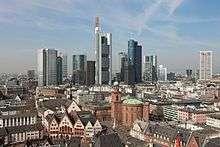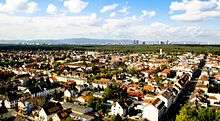Rhine-Main
Rhine-Main (Rhein-Main) is a metropolitan area in Hesse around the confluence of the rivers Rhine and Main. The metropolis is centred around the city of Frankfurt, the largest city in Hesse and Germany's financial powerhouse. It includes Hesse's capital, Wiesbaden. Most of Hesse's population in concentrated in Frankfurt, neighbouring large cities, and suburbs in between.
The region does not have a formal structure - in fact, it straddles the official boundaries and a number of definitions have been adopted for descriptive, statistical, planning and coordination purposes. In its broadest definition, the Rhine-Main metropolis is understood to reach beyond Hesse to include Mainz in Rhineland-Palatinate and Aschaffenburg in Franconia.
Understand
The Rhein-Main Gebeit is a major economic area of Germany which includes the Banks of Frankfurt, insurance companies in Wiesbaden, automotive industry around Rüsselsheim and the chemical and pharmaceutical industries along the Rhine as well as the administrative capitals of Hessen (Wiesbaden) and Rheinland Pfalz (Mainz).

Cities

- 🌍 Frankfurt am Main - Germany's financial centre with an impressive skyline
- 🌍 Bad Homburg
- 🌍 Gelnhausen


- 🌍 Neu-Isenburg - formerly a small town that boomed due to proximity of Frankfurt Airport
- 🌍 Oberursel
- 🌍 Offenbach
- 🌍 Rüsselsheim - home of Opel (Automotive) and Hyundai Motor Company European design office.
- 🌍 Seligenstadt
- 🌍 Wiesbaden - the capital of Hesse and a prominent Kurort
Other destinations
Get in
By plane
Frankfurt Airport lies right in the middle of the region and is connected to pretty much all municipalities of it, most of them directly, by public transportation. It is Germany's largest airport by passenger traffic, and one of Europe's main international and intercontinental hub, so getting there is possible without much trouble from almost anywhere in the world.
The airport has its own local train station, served by the S-Bahn and regional train. There is a separate, long-distance train station, for high-speed connections to other regions of Germany.
By train
Frankfurt Hauptbahnhof is a major railway interchange in the German railway system. Germany's highest-speed railway line connects Frankfurt to Cologne and Düsseldorf, and further with the Ruhr region of North Rhine-Westfalia. Another high-speed line extends southwards to Baden-Württemberg, through Mannheim to Stuttgart, and from there westwards to Munich in Bavaria. A fork of this line runs to Basel in Switzerland. Eastwards, the railway lines fork out to either Hamburg and Hannover in Lower Saxony through Kassel, or to Nürnberg in Bavaria via Würzburg. An international, mostly high-speed, line to Paris leads from Frankfurt through Saarbrücken.
Many high-speed trains stop at Frankfurt Airport and do not stop at Frankfurt Hauptbahnhof. This should not be a problem, as the airport has convenient connections to all cities in the Rhein-Main region. Depending on the direction, some trains stop at other stations in the region. High-speed trains seem to head to Frankfurt directly though, with only some stopping in Wiesbaden.
There are 5 European capitals within roughly 4 hours of Frankfurt. The train travel times by high-speed direct trains are:
- Paris - 3hr 50min
- Berlin - 4hr 10min
- Brussels - 3 hours
- Amsterdam - 4 hours
- Bern - 4hr 10min
Between Frankfurt and other major cities:
- Cologne - 1 hour
- Dortmund - 2hr 35min
- Düsseldorf - 1hr 15min
- Stuttgart - 1hr 15min
- Munich - 3hr 40min
- Hannover - 2hr 40min
- Hamburg - 3hr 50min
- Nuremberg - 2hr 25min
- Leipzig -3hr 25min
- Basel - 2hr 45min
- Zürich - 4 hours
Get around
By public transport
The entire Rhine-Mein region is covered by RMV (Rhein-Main Verkhersverbund), a common public transportation authority. Its main fare zones reach out far beyond Rhine-Main and cover most of Hesse, and even includes the city of Mainz in Rhineland-Palatinate. The tarrif system is complicated and based on a bewildering number of zones, so the use of RMV's fare enquiry service is recommended. There are various types of tickets including single, day and 7-day tickets. There are concessions to children of 6-14 years of age and groups of up to 5 people.
For travel between the cities of the Rhein-Mein conurbation the most important means of public transportation covered by the RMV are the Schnellbahn (called S-Bahn in short) and regional trains. All of the S-Bahn lines and almost all regional train services start or go through the Frankfurt Hauptbahnhof. Of particular note are lines S8 and S9, which go from Wiesbaden through Frankfurt Airport and Frankfurt onto Offenbach and Hanau.
By car
The A3 and A5 cross at Frankfurter Kreuz, Europe's busiest road interchange. The A60 connects Hesse with Mainz and the A66 connect Frankfurt with Wiesbaden and Fulda. Traffic can be very congested at peak times, particularly be because the A643 bridge (one of only three road crossings of the Rhine in the region) has restricted access.
See
- Kurhaus und Hessisches Staatstheater in Wiesbaden
- Museumsufer and Museums in Frankfurt
- The top of the Main Tower in Frankfurt provides a great view of the area.
- Saalburg, reconstruction of a Roman fort north of Bad Homburg
Do
Frankfurt has several theatres, operas and live event venues and a lively cultural scene. Wiesbaden is known for its casino and thermal baths.
Itineraries
- Rheinsteig hike from Wiesbaden Schloss Biebrich to Bonn
- The German Limes Road walk and cycle path following the historic boundary of the Roman Empire
Eat
As the area is well-to-do and attracts likewise travellers, there is a wide selection of well-regarded fine dining establishments.
Drink
The party scene is not as lively as in Berlin or Cologne, but there are many venues for evening drinks and likewise relaxed cafes and beer gardens. Some places cater to the yuppie crowd that work for one of the banks and/or the stock exchange, so the mood and size of the crowd at some places may reflect the economic situation of the time or even the day.
Sleep
As one of Germany's most popular travel destinations, Frankfurt has a very large accommodation base, mostly geared towards business travellers and consisting of mid-level to upscale hotels. Price levels match the business travellers' budget and rates will spike during major events, like trade fairs, in Frankfurt. Be ause of intense competition, however, most of the hotels offer a high standard of service, and outside of peak times you can find really good offers on accommodation at even the more upscale hotels.
Other cities in the region offer more budget-friendly accommodation opportunities, and thanks to short travel times on the RMV network they can be viable alternatives. Travel time to Frankfurt and other cities' centres can be shorter from any of the centres, while many hotels in Frankfurt are in relatively remote locations, so the central position in Frankfurt can be misleading. The prices and standards for comparable-level properties tend to be significantly lower outside of Frankfurt.
Stay safe
While incidence of violent crimes and robberies decreased in recent years, there is an increased risk of pickpocketing. Drug-dealing and prostitution is also quite prevalent, especially in Frankfurt. Police are generally helpful and easy to find.